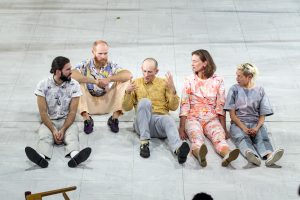When Israeli director Yael Ronen began rehearsals for her first production at the Kammerspiele in July 2016, there was no play yet, only a title. The first three weeks were spent on research and discussion, mainly about relationships today and the influence of technological developments on the future of sex: dating apps, body implants and cybersex. But when David S. went on a killing spree at a shopping centre in Munich on 22 July 2016, people thought Munich had become the first German target of a major terrorist attack. Presumably, there was more than one perpetrator targeting sites all over the city. This information proved to be wrong, yet rumours and speculation spread fear and panic through the channels of the social media. After this incident, the theme of the production changed dramatically – this presumed terrorist attack became the “point of no return” in Yael Ronen’s production.

Focusing on the reaction of individuals to terrorism, Yael Ronen and her cast examine the complex psychological dynamics during and after terrorist attacks: actual and perceived reality as presented by the media leading to paranoia and hysteria. How do people react to terror? The first two scenes of the production deal with terror on an individual level. How do the actors cope with their own experiences during the shooting spree? The second half of the play focuses on an incident in Israel when an innocent man was suspected of a terrorist attack and killed by a lynch mob near a bus station.
Wolfgang Menardi‘s ingenious stage design combines a slippery slope with homely scenery: a fox and a doe are peeking out of a miniature forest consisting of a birch tree and some shrubbery whilst birds are singing and bees are humming. The actors are roped up at first to conquer the slope without sliding down into a barricade which is made up of chairs. Mirrors are lining the stage to confront the audience with their own reflections whilst the floor is used for a variety of projections including archived material of terrorist attacks.
As the actors begin to emerge from a hole in the floor, they share their experiences on that fateful evening. Damian Regetz is scared of being on stage because a shooter might be in the audience and he would be a prime target before considering somewhat later: “Should I use terrorism to improve my performance?” Dejan Bućin remembers the panic he felt when getting locked in at a clothes discounter without a charger for his powerless mobile phone. Wiebke Puls, in diva mode, finds herself a member of the audience together with her child instead of being on stage and, seeing her character in this particular situation as an amalgam of Supermom, Gaia and St. Mary, asked herself: “What would my character do in this situation?” Niels Bormann heroically chooses a seat near the window whilst enjoying his fish soup in the canteen whilst Jelena Kuljić tell a group of children about past atrocities in Serbia instead of comforting them.
Yael Ronen’s production is a very dark satire targeting the hysteria in western countries caused by terrorism. Although heart attacks, cancer and depression kill far more people than acts of terrorism – you may add guns in the U. S.-, the fear of becoming a victim of a terrorist attack has often turned into sheer paranoia. Being from Israel, Ronen has a somewhat different perspective. The re-enactment of the mass shooting in Munich and the relentless pounding of the terror suspect in Israel makes us pause.
The absurdity and satirical elements of the evening create a certain distance to the victims and some of the satire could be considered in bad taste but it is a relief to be able to laugh about some of the things that one fears the most. 4/5
Review written by Carolin Kopplin.
To find out more about the The Point of No Return, visit here…
The production is in German and English with English and German surtitles.


Leave a Comment